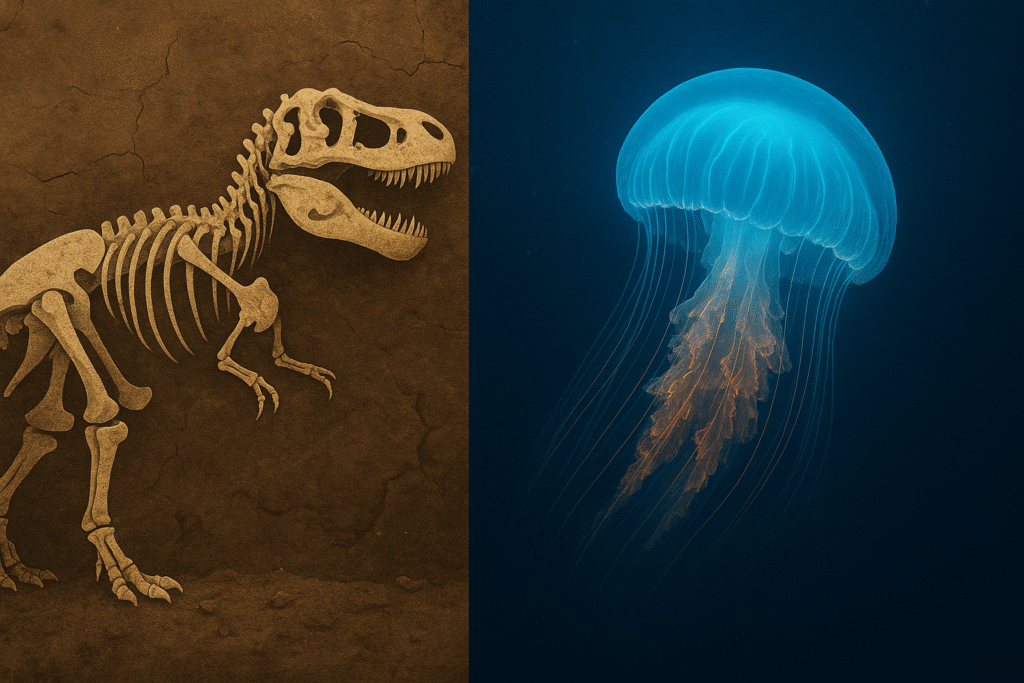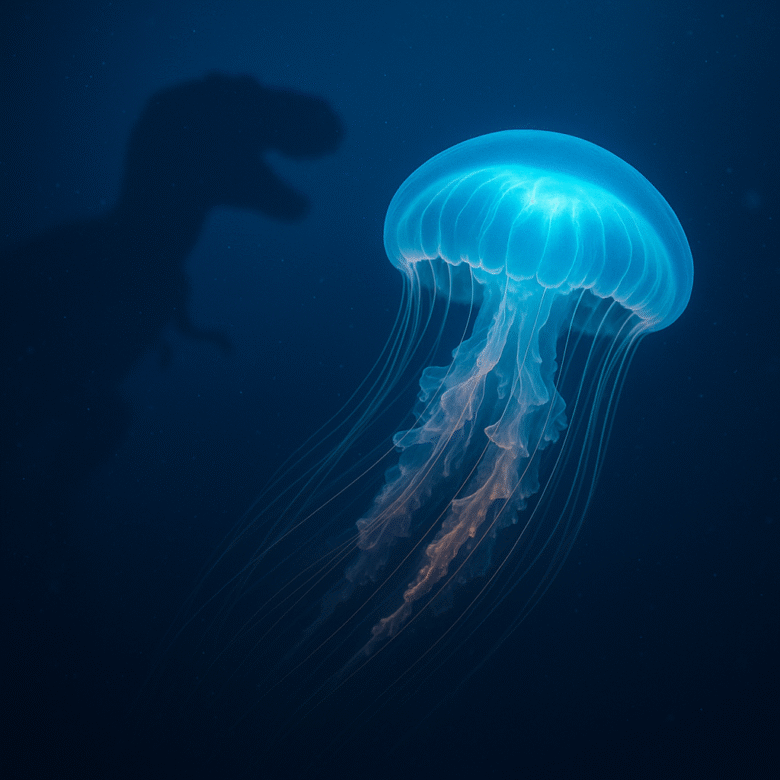Fun fact: Jellyfish have been floating through Earth’s oceans for more than 500 million years—long before dinosaurs ever stomped the land.
Dinosaurs, with their massive bodies and razor-sharp teeth, dominated Earth for nearly 165 million years. And yet, they vanished in a flash when an asteroid hit about 66 million years ago. Jellyfish, delicate and brainless blobs of goo, not only survived but continue to thrive in every ocean today. So, why did jellyfish outlive dinosaurs? The answer may teach us something profound about survival, humility, and the real meaning of adaptation.
Fragile? Or Perfectly Designed?
At first glance, jellyfish look like the worst candidates for survival. No bones, no brain, no heart—how could such fragile creatures possibly endure mass extinctions that wiped out apex predators?
The secret is that jellyfish aren’t fragile at all. Their simplicity is their strength. While dinosaurs depended on complex food chains and stable climates, jellyfish thrived on being basic. They don’t need much—just plankton, sunlight-warmed water, and the ability to drift with the currents.
Sometimes survival isn’t about being the biggest or the smartest. It’s about being flexible enough to live with less.
The Long Survival Story
Let’s take a quick time-travel tour:
500 Million Years Ago: Jellyfish emerge in the oceans, long before dinosaurs or even trees.
250 Million Years Ago: The “Great Dying” wipes out about 90% of species. Jellyfish glide through unscathed.
66 Million Years Ago: The asteroid that ended the dinosaurs plunges Earth into darkness and chaos. Once again, jellyfish float past disaster.
Today: Despite climate change, overfishing, and plastic pollution, jellyfish populations are booming in many seas—sometimes too much for human comfort.
Their uninterrupted survival record is unmatched. Even cockroaches can’t boast such deep evolutionary history.
Lessons in Adaptation
So, what can jellyfish teach us about resilience? A lot.
Simplicity Wins
Jellyfish don’t waste energy on frills. No skeletons to break, no lungs to clog, no brains to confuse. By staying minimal, they avoid many points of failure. Humans, by contrast, overcomplicate survival.
Go With the Flow
Jellyfish don’t fight currents—they use them. Their passive drifting strategy means less energy spent, more survival. Maybe we could learn something: sometimes resilience is less about resistance and more about flexibility.
Adaptability Over Dominance
Dinosaurs ruled their ecosystems, but when the system collapsed, so did they. Jellyfish never depended on dominance. Instead, they adapted to change, even flourishing in chaos. In today’s uncertain world, maybe survival belongs less to the rulers and more to the adapters.
Immortality Is Real (Sort Of)
Some species, like Turritopsis dohrnii, are known as “immortal jellyfish” because they can revert to earlier life stages when stressed. It’s as if humans could turn into toddlers whenever life got tough. Ridiculous? Yes. Effective? Absolutely.

Case Studies: Jellyfish vs. Humans
- Nuclear Tests
After atomic bombs were tested in the Pacific, jellyfish kept thriving in irradiated waters. Their resilience to extreme conditions puts many “tough” species to shame. - Climate Change
Warming oceans have devastated coral reefs and fish stocks. Jellyfish, however, often flourish in warmer, oxygen-poor waters. Rising sea temperatures? For them, it’s an opportunity. - Urban Oceans
Ports and harbours clogged with pollution? Jellyfish often swarm where other life struggles. They might be the ultimate survivors of human negligence.
The Provocative Part: Are We the Dinosaurs?
Here’s the uncomfortable truth. Humans love to think of ourselves as the ultimate survivors—smarter than any species before us. But what if we’re actually closer to dinosaurs? Dependent on fragile systems, addicted to complexity, unable to adapt quickly enough.
Jellyfish, on the other hand, might just glide past us the way they floated past T-Rex. If Earth entered another mass extinction tomorrow, who would you bet on: humans with smartphones, or jellyfish with nothing but goo and instinct?
Why Jellyfish Are Thriving Today
Ironically, many modern human activities are helping jellyfish.
Overfishing removes their predators.
Pollution creates low-oxygen “dead zones” where jellyfish thrive.
Plastic Bags in the ocean even resemble jellyfish, killing sea turtles that mistake them for food—removing competitors.
Our mistakes may be fuelling a jellyfish empire. Some scientists warn of “jellyfish blooms” disrupting fisheries, clogging power plants, and even shutting down nuclear facilities by swarming intake pipes. Imagine being outsmarted not by AI (artificial intelligence), but by jelly.
Conclusion: Float Like a Jellyfish
Jellyfish outlived dinosaurs because they understood something we often forget: survival isn’t about being dominant, but about being adaptable. Their recipe for success is both infuriatingly simple and deeply humbling.
So next time you see a jellyfish drifting near the shore, don’t just dismiss it as a mindless blob. That blob is older than mountains, tougher than empires, and possibly more future-proof than us.
Maybe the lesson is this: in a world of uncertainty, it’s not the strongest who endure, but the simplest. To outlive disaster, sometimes you just have to go with the flow.
Author’s Note
Writing this made me think that maybe our skyscrapers, satellites, and smartphones are not signs of resilience but of fragility. Perhaps the real survivors are the soft, silent ones we overlook. And if we’re not careful, jellyfish may watch our species vanish—just as they once watched the dinosaurs.
G.C., Ecosociosphere contributor.
References and Further Reading
- Smithsonian Ocean Portal – Jellyfish
- National Geographic – Immortal Jellyfish
- Fascinating facts about jellyfish – Marine Conservation Society
- Sea turtles often mistake plastic bags for food, namely jellyfish.
- “It is not the strongest species that survive, nor the most intelligent, but the one most responsive to change,” Charles Darwin.




